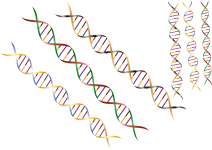How Does the National DNA Database Work?

With technology becoming increasingly sophisticated, DNA evidence is being relied on in more criminal cases than ever before. But the idea of taking DNA evidence and using it to solve crimes has led to controversy and raised some interesting debate among politicians, the public and civil liberties organisations.
DNA exists in all our living cells and it is unique for almost every person, containing all the biological information our bodies need to develop and function. As almost every DNA profile is unique, police can use this information to determine whether a person was present at the scene of a crime, and even what they are likely to have done.
DNA evidence is not entirely accurate however, and mistakes and misidentification can certainly happen, including contaminated, incorrectly matched and mislabelled samples. Jurors can also misinterpret the meaning of a declared match, incorrectly assuming, for example, that ‘a one in ten thousand likelihood of the profile matching another person in the community’ means that it is highly unlikely to be someone other than the matched suspect. Much literature has been written about how this can be highly misleading, especially when the subject is from a racial background that is uncommon in the community.
Currently, DNA is held on a national database where police can gain access to information relating to crimes that have been committed. In many serious cases, when a person is convicted of a crime they will have a DNA sample taken. Police can also apply to take the DNA from people they suspect may have committed a crime as part of the investigation process. However, there are strict laws in place governing when and how police officers are allowed to obtain DNA samples, and what they do with the information once they have it.
When can police ask for a DNA sample?
The obtaining of DNA is governed by the Crimes (Forensic Procedures) Act 2000, which dictates how and when DNA evidence can be taken. According to this legislation, forensic procedures can be carried out on suspects with their informed consent. They can also be performed on children and adults who are classified as ‘incapable’ under certain conditions.
Informed consent means that the person being tested has agreed to the procedure and that they have been provided with all the required information.
As well as informed consent, the police officer has to be satisfied that the person is a suspect and that there are reasonable grounds to believe that the forensic procedure could produce evidence relating to this offence.
How are samples taken?
Forensic procedures are separated into two different categories – intimate forensic procedures and non-intimate forensic procedures.
Intimate forensic procedures involve more invasive methods of obtaining DNA samples, including blood samples or samples of material taken from the private parts such as pubic hair or material scraped from that area. These procedures can only be carried out on people who have been suspected of having committed certain offences known as prescribed offences.
Non-intimate forensic procedures include saliva swabs, taking hair from a person’s head, nail clippings, and any samples taken from the external parts of a person’s body, excluding their private parts. These forensic procedures can be carried out on a person who has been suspected of committing a summary or an indictable offence.
Can I refuse to give police my DNA?
You can refuse to provide DNA samples to police, in which case they will need to apply for a court order. To get that order, police will need to show that the sample could assist in the investigation of the alleged offence. If it is unlikely to assist, the court may refuse to grant the order. If it is likely to assist, the court may grant the order and compel you to provide your DNA. Before any DNA samples are taken, you have the right to speak to a criminal defence lawyer. This is always a good idea, especially if you believe you are a suspect in a criminal case, as opposed to the samples being requested for elimination purposes.
Can I get my DNA profile deleted?
Laws surrounding the destruction of DNA evidence vary between states. In NSW, samples will be destroyed if the suspect has had their conviction quashed, or 12 months after the sample was taken if proceedings against the person suspected haven’t been instituted. They can also be destroyed if no conviction is recorded or if the person has been acquitted by the court.
Currently, there is no process in place to allow people to formally request their DNA information be deleted. If you have previously been convicted of a crime and had DNA taken, it can be kept on the national database indefinitely in a move that many believe is a breach of civil liberties.
Back-capture program
In a highly-controversial move, police in NSW are currently going to the homes of people with previous convictions and obtaining DNA samples to add to the database. Under the DNA Back-Capture Program, police are taking DNA samples from people who have previously served a prison sentence for an indictable offence carrying a maximum penalty of at least five years, and have been convicted of a further offence since then.
Criminal lawyers across NSW have spoken out against this program as it goes against the principles of rehabilitation, and many of the previous offenders approached may have not committed an offence or had any contact with the criminal justice system for a decade or more.
If you are under arrest, or you are asked for a DNA sample for any other reason by police, it is always a good idea to speak to a criminal defence lawyer before you consent.






